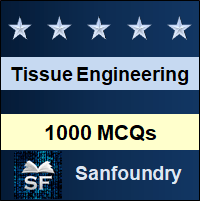
Tissue Engineering Multiple Choice Questions Highlights
- 1000+ Multiple Choice Questions & Answers (MCQs) in Tissue Engineering with a detailed explanation of every question.- These MCQs cover theoretical concepts, true-false(T/F) statements, fill-in-the-blanks and match the following style statements.
- These MCQs also cover numericals as well as diagram oriented MCQs.
- These MCQs are organized chapterwise and each Chapter is futher organized topicwise.
- Every MCQ set focuses on a specific topic of a given Chapter in Tissue Engineering Subject.
Who should Practice Tissue Engineering MCQs?
– Students who are preparing for college tests and exams such as mid-term tests and semester tests on Tissue Engineering.- Students who are preparing for Online/Offline Tests/Contests in Tissue Engineering.
– Students who wish to sharpen their knowledge of Tissue Engineering Subject.
- Anyone preparing for Aptitude test in Tissue Engineering.
- Anyone preparing for interviews (campus/off-campus interviews, walk-in interview and company interviews).
- Anyone preparing for entrance examinations and other competitive examinations.
- All - Experienced, Freshers and College / School Students.
Tissue Engineering Chapters
Here's the list of chapters on the "Tissue Engineering" subject covering 100+ topics. You can practice the MCQs chapter by chapter starting from the 1st chapter or you can jump to any chapter of your choice.- Introduction to Tissue Engineering
- Biomaterials in Tissue Engineering
- Harnessing the Potential of Stem Cells from Different Sources for Tissue Engineering
- Induced Pluripotent Stem Cells in Scaffold-Based Tissue Engineering
- Biosensors for Optimal Tissue Engineering
- Bioreactors in Tissue Engineering
- Tissue-Engineered Human Skin Equivalents
- Articular Cartilage Tissue Engineering
- Liver Tissue Engineering
- Development of Tissue-Engineered Blood Vessels
1. Introduction to Tissue Engineering
The section contains multiple choice questions and answers on tissue engineering history, scope and fundamentals, comparision between tissue engineering and regenerative medicine, cell culture basics, tissue culture methods, ectodermal, mesodermal and endothelial cells, cell adhesion, cell migration, biomaterial tissue interactions, hydrogels, bioceramics and synthetic polymers for biomaterial processings.
2. Biomaterials in Tissue Engineering
The section contains questions and answers on biomaterials properties and fabrication methods, natural and synthetic biomaterials.
|
|
|
3. Harnessing the Potential of Stem Cells from Different Sources for Tissue Engineering
The section contains MCQs on stem cells, embryonic and induced pluripotent stem cells, adult, mesenchymal and hematopoietic stem cells, whartons jelly stem cells, bone, cartilage and cardiac tissue engineering using stem cells, tissues including skin, liver, bladder and pancreas using stem cells.
4. Induced Pluripotent Stem Cells in Scaffold-Based Tissue Engineering
The section contains multiple choice questions and answers on scaffold based tissue engineering.
|
|
5. Biosensors for Optimal Tissue Engineering
The section contains questions and answers on biosensors fundamentals, spectroscopic biosensing techniques and electrochemical biosensing methods.
|
|
|
6. Bioreactors in Tissue Engineering
The section contains MCQs on bioreactor basics and types, bioreactors for liver, neural and musculoskeleton tissue engineering.
7. Tissue-Engineered Human Skin Equivalents
The section contains multiple choice questions and answers on tissue engineered human skin equivalents development.
|
|
8. Articular Cartilage Tissue Engineering
The section contains questions and answers on articular cartilage structure and function, articular cartilage lesions and repair.
|
|
|
9. Liver Tissue Engineering
The section contains MCQs on liver biology, liver biomechanical properties and haemodynamics.
|
|
|
10. Development of Tissue-Engineered Blood Vessels
The section contains multiple choice questions and answers on blood vessels biology and engineering vascular replacement grafts strategies.
|
|
Wish you the best in your endeavor to learn and master Tissue Engineering!
